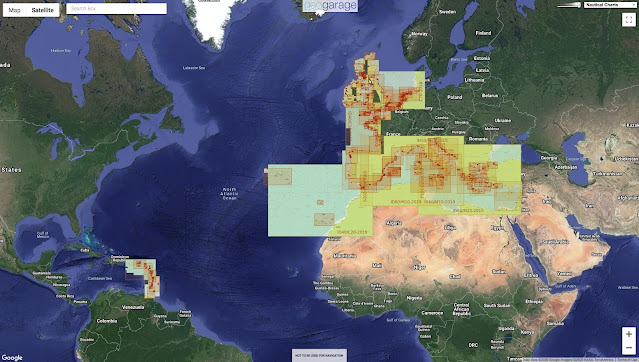From Imray
"After more than 200 years of guiding mariners, Imray will begin phasing out its chart publishing operations, marking the end of an era.
This tough decision reflects the shift toward digital navigation, but we’re not going anywhere.
We’ll continue supporting sailors with our trusted pilot books, cruising guides, and the popular ‘Explore with Imray’ digital product.
Paper charts will be supported until the end of the 2025 season, so now’s the time to stock up.
We thank our incredible customers and partners for their loyalty. As we chart a new course, our mission to provide reliable navigation resources lives on. "
An opportunity for collectors and historians
The announcement of the end of paper map production also opens the door to the preservation of a historical legacy.
The announcement of the end of paper map production also opens the door to the preservation of a historical legacy.
Imray is offering potential buyers the opportunity to take over its cartography business, or to acquire the rights to its name.
This approach could be of interest to maritime history enthusiasts, or those wishing to perpetuate the paper chart tradition in a more confidential or museum context.
For their part, traditional navigation enthusiasts and collectors will have the opportunity to acquire the latest editions of these emblematic charts, which have become rare and precious objects.
For their part, traditional navigation enthusiasts and collectors will have the opportunity to acquire the latest editions of these emblematic charts, which have become rare and precious objects.
Blueback chart of Cuba 1:1350000 scale from James Imray in 1854
click on the picture to magnify or see Geographicus
Blueback nautical charts began appearing in London in the late 18th century.
Bluebacks,
as they came to be called, were privately published large format
nautical charts known for their distinctive blue paper backing.
The
backing, a commonly available blue manila paper traditionally used by
publishers to warp unbound pamphlets, was adopted as a practical way to
reinforce the low-quality paper used by private chart publishers in an
effort to cut costs.
The earliest known blueback charts include a 1760 chart issued by Mount and Page, and a 1787 chart issued by Robert Sayer.
The
tradition took off in the early 19th century, when British publishers
like John Hamilton Moore, Robert Blachford, James Imray, William
Heather, John William Norie, Charles Wilson, David Steel, R. H. Laurie,
and John Hobbs, among others, rose to dominate the chart trade.
Bluebacks
became so popular that the convention was embraced by chartmakers
outside of England, including Americans Edmund March Blunt and George
Eldridge, as well as Scandinavian, French, German, Russian, and Spanish
chartmakers.
Blueback
charts remained popular until the late 19th century, when government
subsidized organizations like the British Admiralty Hydrographic Office
and the United States Coast Survey, began issuing their own superior
charts on high quality paper that did not require reinforcement.
Links :
- Imray Facebook / Twitter / LinkedIn / Instagram / The makers of the Blueback charts
- Yachting Monthly : Imray to stop publishing paper charts – charts business for sale
- All at Sea : Imray to phase out chart publishing and refocus activity
- SailworldCruising : Imray to phase out chart publishing and refocus activity
- MCA : Recognition as a private chart producer
- GeoGarage blog :
Curiosities at the chart makers Imray / Old Imray blueback nautical chart or map of the Irish or St. George's Channel (Irish Sea) and English Channel


Pratical Boat Owner : End of Imray paper charts: historic publisher to phase out chart publishing in 2025
ReplyDeleteBoat Industry : Fin d'une époque : Imray met fin à ses cartes marines papier en 2025
ReplyDeletePratical Boat Owner : Plan to secure future of nautical publisher Imray paper charts
ReplyDelete